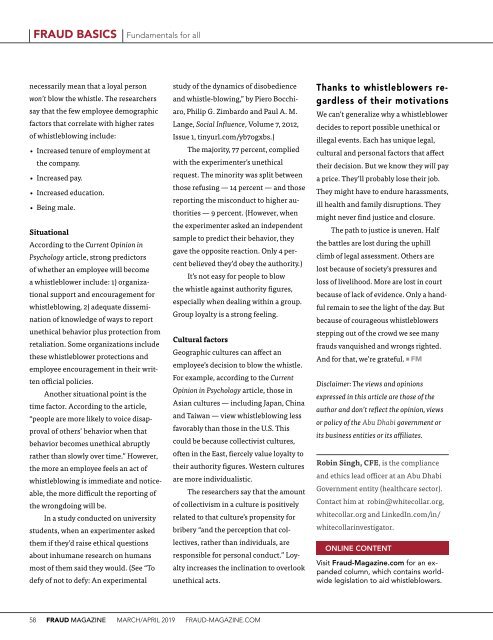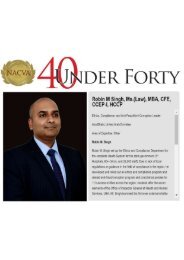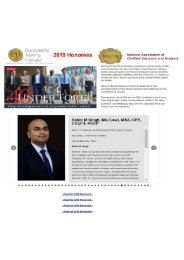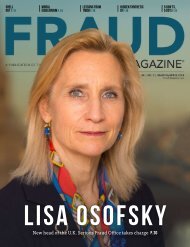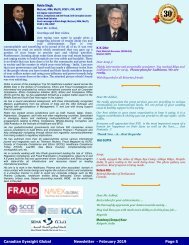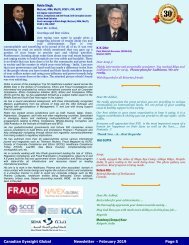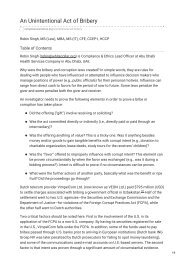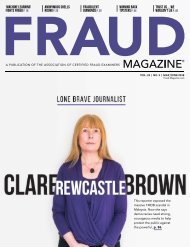Why do employees blow the #whistle? by #Robin #Singh (Published by #ACFE)
Read about what goes through the mind of a #whistleblower by Robin Singh. What are their thought process, sufferings, and internal dilemmas when they blow the whistle. According to the author, it is a true fight for #integrity and #ethics and intolerance towards #fraud, #misconduct, #non-compliance. Furthermore, most of the #whistleblowers are not a #compliance #Officer or a #fraud #Investigator or a #regulator, rather a common person on the ground who ensure the ecological balance between existence of a company versus practices adopted to reach a higher share price.
Read about what goes through the mind of a #whistleblower by Robin Singh. What are their thought process, sufferings, and internal dilemmas when they blow the whistle.
According to the author, it is a true fight for #integrity and #ethics and intolerance towards #fraud, #misconduct, #non-compliance. Furthermore, most of the #whistleblowers are not a #compliance #Officer or a #fraud #Investigator or a #regulator, rather a common person on the ground who ensure the ecological balance between existence of a company versus practices adopted to reach a higher share price.
You also want an ePaper? Increase the reach of your titles
YUMPU automatically turns print PDFs into web optimized ePapers that Google loves.
FRAUD BASICS<br />
Fundamentals for all<br />
necessarily mean that a loyal person<br />
won’t <strong>blow</strong> <strong>the</strong> whistle. The researchers<br />
say that <strong>the</strong> few employee demographic<br />
factors that correlate with higher rates<br />
of whistle<strong>blow</strong>ing include:<br />
• Increased tenure of employment at<br />
<strong>the</strong> company.<br />
• Increased pay.<br />
• Increased education.<br />
• Being male.<br />
Situational<br />
According to <strong>the</strong> Current Opinion in<br />
Psychology article, strong predictors<br />
of whe<strong>the</strong>r an employee will become<br />
a whistle<strong>blow</strong>er include: 1) organizational<br />
support and encouragement for<br />
whistle<strong>blow</strong>ing, 2) adequate dissemination<br />
of knowledge of ways to report<br />
unethical behavior plus protection from<br />
retaliation. Some organizations include<br />
<strong>the</strong>se whistle<strong>blow</strong>er protections and<br />
employee encouragement in <strong>the</strong>ir written<br />
offcial policies.<br />
Ano<strong>the</strong>r situational point is <strong>the</strong><br />
time factor. According to <strong>the</strong> article,<br />
“people are more likely to voice disapproval<br />
of o<strong>the</strong>rs’ behavior when that<br />
behavior becomes unethical abruptly<br />
ra<strong>the</strong>r than slowly over time.” However,<br />
<strong>the</strong> more an employee feels an act of<br />
whistle<strong>blow</strong>ing is immediate and noticeable,<br />
<strong>the</strong> more diffcult <strong>the</strong> reporting of<br />
<strong>the</strong> wrong<strong>do</strong>ing will be.<br />
In a study conducted on university<br />
students, when an experimenter asked<br />
<strong>the</strong>m if <strong>the</strong>y’d raise ethical questions<br />
about inhumane research on humans<br />
most of <strong>the</strong>m said <strong>the</strong>y would. (See “To<br />
defy of not to defy: An experimental<br />
study of <strong>the</strong> dynamics of disobedience<br />
and whistle-<strong>blow</strong>ing,” <strong>by</strong> Piero Bocchiaro,<br />
Philip G. Zimbar<strong>do</strong> and Paul A. M.<br />
Lange, Social Influence, Volume 7, 2012,<br />
Issue 1, tinyurl.com/yb7ogxbs.)<br />
The majority, 77 percent, complied<br />
with <strong>the</strong> experimenter’s unethical<br />
request. The minority was split between<br />
those refusing — 14 percent — and those<br />
reporting <strong>the</strong> misconduct to higher authorities<br />
— 9 percent. (However, when<br />
<strong>the</strong> experimenter asked an independent<br />
sample to predict <strong>the</strong>ir behavior, <strong>the</strong>y<br />
gave <strong>the</strong> opposite reaction. Only 4 percent<br />
believed <strong>the</strong>y’d obey <strong>the</strong> authority.)<br />
It’s not easy for people to <strong>blow</strong><br />
<strong>the</strong> whistle against authority figures,<br />
especially when dealing within a group.<br />
Group loyalty is a strong feeling.<br />
Cultural factors<br />
Geographic cultures can affect an<br />
employee’s decision to <strong>blow</strong> <strong>the</strong> whistle.<br />
For example, according to <strong>the</strong> Current<br />
Opinion in Psychology article, those in<br />
Asian cultures — including Japan, China<br />
and Taiwan — view whistle<strong>blow</strong>ing less<br />
favorably than those in <strong>the</strong> U.S. This<br />
could be because collectivist cultures,<br />
often in <strong>the</strong> East, fiercely value loyalty to<br />
<strong>the</strong>ir authority figures. Western cultures<br />
are more individualistic.<br />
The researchers say that <strong>the</strong> amount<br />
of collectivism in a culture is positively<br />
related to that culture’s propensity for<br />
bribery “and <strong>the</strong> perception that collectives,<br />
ra<strong>the</strong>r than individuals, are<br />
responsible for personal conduct.” Loyalty<br />
increases <strong>the</strong> inclination to overlook<br />
unethical acts.<br />
Thanks to whistle<strong>blow</strong>ers regardless<br />
of <strong>the</strong>ir motivations<br />
We can’t generalize why a whistle<strong>blow</strong>er<br />
decides to report possible unethical or<br />
illegal events. Each has unique legal,<br />
cultural and personal factors that affect<br />
<strong>the</strong>ir decision. But we know <strong>the</strong>y will pay<br />
a price. They’ll probably lose <strong>the</strong>ir job.<br />
They might have to endure harassments,<br />
ill health and family disruptions. They<br />
might never find justice and closure.<br />
The path to justice is uneven. Half<br />
<strong>the</strong> battles are lost during <strong>the</strong> uphill<br />
climb of legal assessment. O<strong>the</strong>rs are<br />
lost because of society’s pressures and<br />
loss of livelihood. More are lost in court<br />
because of lack of evidence. Only a handful<br />
remain to see <strong>the</strong> light of <strong>the</strong> day. But<br />
because of courageous whistle<strong>blow</strong>ers<br />
stepping out of <strong>the</strong> crowd we see many<br />
frauds vanquished and wrongs righted.<br />
And for that, we’re grateful. n FM<br />
Disclaimer: The views and opinions<br />
expressed in this article are those of <strong>the</strong><br />
author and <strong>do</strong>n’t reflect <strong>the</strong> opinion, views<br />
or policy of <strong>the</strong> Abu Dhabi government or<br />
its business entities or its affliates.<br />
Robin Singh, CFE, is <strong>the</strong> compliance<br />
and ethics lead offcer at an Abu Dhabi<br />
Government entity (healthcare sector).<br />
Contact him at robin@whitecollar.org,<br />
whitecollar.org and LinkedIn.com/in/<br />
whitecollarinvestigator.<br />
Visit Fraud-Magazine.com for an expanded<br />
column, which contains worldwide<br />
legislation to aid whistle<strong>blow</strong>ers.<br />
58 FRAUD MAGAZINE MARCH/APRIL 2019 FRAUD-MAGAZINE.COM


